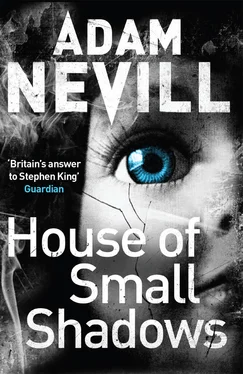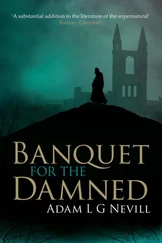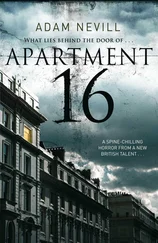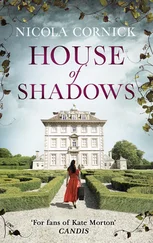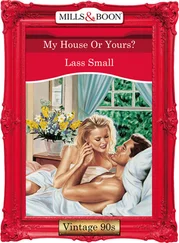The only significant difference to the room on this visit was that each of the little white beds was now empty. And all of the bedclothes were neatly made, to suggest the beds had been unoccupied for a while. The vintage leather passenger trunk was also absent, as were the small leather boots and silken slippers that had been at the foot of each bed.
The absence of Mason’s morbid creations was reassuring, but only superficially. Catherine recalled her notion that small forms had followed her down the staircase the night before, and inhabited the lightless spaces below.
No!
The marionettes had been removed by people, to be used in some vile performance at the pageant. She told herself this as she stood frozen in the doorway of the room. And then she told herself the same thing again. The second time her lips moved.
After taking one photograph, she closed the nursery door and walked to the far end of the passage, where an alcove was visible beside the arched window overlooking the garden. Inside the alcove four narrow steps ascended to a rosewood door. There was an iron handle in the shape of a ring. It would lead to the attic under the pointed roofs with the thin arched window casements that she had seen from outside. The door was locked. She stood against it and listened.
Did she hear a tap tap tap from the other side? In the distance. Maybe. Yes, a faint far-off knocking. Wood on wood. Up there. A rhythmic motion. Something stirred by the wind. Or a mechanism. Could be anything. She pulled away from the door when she thought of the chipped wooden hands of the Master of Revels clapping.
On the first floor, Catherine made hesitant progress. She avoided Edith’s drawing room due to an irrational fear that the preserved animals would tell their owner she had been inside the room without permission.
Next to the drawing room, she peered into a games room. There was a long-unused billiard table and an iron fireplace. The part of herself that used to evaluate houses and their contents felt peculiarly distant, but tried to revive itself when she looked inside the library.
The Eastlake bookcases that housed Mason’s books, she was sure would fetch between five hundred and a thousand pounds each. The first editions lining the shelves she could not even begin to evaluate. There were at least a thousand volumes.
She traced her finger along the spines closest to the door: Preparation of Scientific Specimens of Mammals in the Field, 1931, Museum of Zoology, University of Michigan; Directions for Preserving Specimens of Large Mammals, 1911, Museum of Vertebrate Zoology, Berkeley.
The door beside the library opened onto light produced from twin desk lamps, as if the room was in use. This was the study. The place of M. H. Mason’s death.
Catherine half expected to see someone rise from the chair before the desk, or to turn away from the bookcases that were packed tight with more leathery book spines and bundles of paper tied with twine. Before the one window, a draughtsman’s drawing board was angled to catch what light fell through the glass.
She sniffed at the air. A trace of stale pipe tobacco. Leonard coated the office with a similar odour. But how had this room still retained a vestige of M. H. Mason’s own pipe smoke?
She sensed a lingering presence, that of a man driven and uncompromising, who would tolerate no intrusion or interference with work that had been encyclopaedic, and curious, with unfathomable goals. Work that had eventually killed him.
Whatever he had achieved inside this house, she was seeing mere residues. An old, damaged, grotesque film, poorly lit photographs in dim corridors, a room populated with preserved mammals, beehives crawling with bluebottle flies, a nursery of marionettes with an ancestry Edith preposterously claimed stretched back centuries. But his vision was greater. She could sense this, but not define it. M. H. Mason’s endgame eluded her. His niece spoke only to obscure and tantalize and mislead. And half of what she said was fantasy. But Mason’s ultimate goal seemed intent on suggesting itself to her in terms that could not be understood logically.
Her irrational instincts suggested that her recent dreams offered a more suitable path to enlightenment. Could she be stuck inside a giant doll’s house? They had even got her to dress the part. Or maybe the Red House was a continuous puppet show in a vast theatre, in which the cast performed nonsensical and abstract scenes from dramas composed by a once-fine mind, long-since damaged and haunted into the grim-surreal.
She cut off the suggestions from her imagination when she realized this was how the mad must consider the world.
Edith declared the rooms of the house had remained completely unaltered since her uncle’s death. If it were true, the pipe and open earthenware tobacco jar, and the neat arrangement of pencils beside the open notebooks upon the huge desk, had stayed in the same position for fifty years. As had the crystal tumbler, and what had evaporated to leave a brownish stain at the bottom of the glass. Perhaps only Maude’s duster had made contact with anything within this capsule, frozen from the moment its master expired by his own hand.
‘You crazy bitches.’ Catherine confirmed her gravest fear when she spotted the ancient black stain spread across the leather desktop. Mason must have opened his throat over the desk. And Edith’s mother had left the blood to dry. Catherine took one photograph and looked away.
But Edith’s curatorial integrity had been compromised by one thing. The straight razor was missing. It should have been upon the desktop, or beside the chair where it fell from cold white fingers. Perhaps the sight of that was too much, even for Violet Mason. And for Edith too.
The household, his own family, had fostered Mason’s delusions and morbid insanity. When he had gone, they’d preserved it. Why? The dying village honoured him with a pageant. Why? It was incredible, and incredibly sick. What was the attraction? If the devotion to his legacy was not inspired by any kind of charismatic allure that she could determine, or sustained by any attempt by the creator to conceal what was evidently misguided and unhealthy, and if loyalty was not rewarded with material wealth, then what kind of a hold did a deranged former army chaplain still command over the entire area and his only surviving relative?
Gingerly, Catherine approached the first wooden cabinet in the study. The thought of actually touching anything in M. H. Mason’s study made her giddy, excited like a child. The cabinet was similar to the kind of furniture that held index cards in old university libraries. The drawers were unlabelled, but the top drawer contained hundreds of letters. As did the three drawers beneath. She walked her fingers across the top of the ancient paper. At random she pulled out envelopes.
A great many had been sent to him by a Hessen, Felix. The name meant nothing to her. Coldwell, Eliot, also appeared in abundance in the top drawer. She had never heard that name before either. Many of the Coldwell letters seemed more recent. He had been writing to Mason as late as the early sixties. The index cards were alphabetized and Coldwell and Hessen consumed most of the top two drawers. There were also a great many letters from someone called Mathers, Samuel, catalogued with S.R.I.A beside his name. Mason had once conducted lengthy correspondences with a small number of people, but she had no idea who any of these men were.
The adjacent cabinet was filled to capacity with ageing photographs protected within dividers made from brown card. She raised a folio at random and leafed through the pictures. They featured the construction of the puppet theatre upon the rear lawn when it had known better days. Mason must have been behind the camera. Whenever she was featured, Violet Mason was dressed like a man in dark overalls and worked without looking at the camera. The construction appeared to be highly organized, if not systematic, with the building materials laid out beside large paper plans.
Читать дальше
